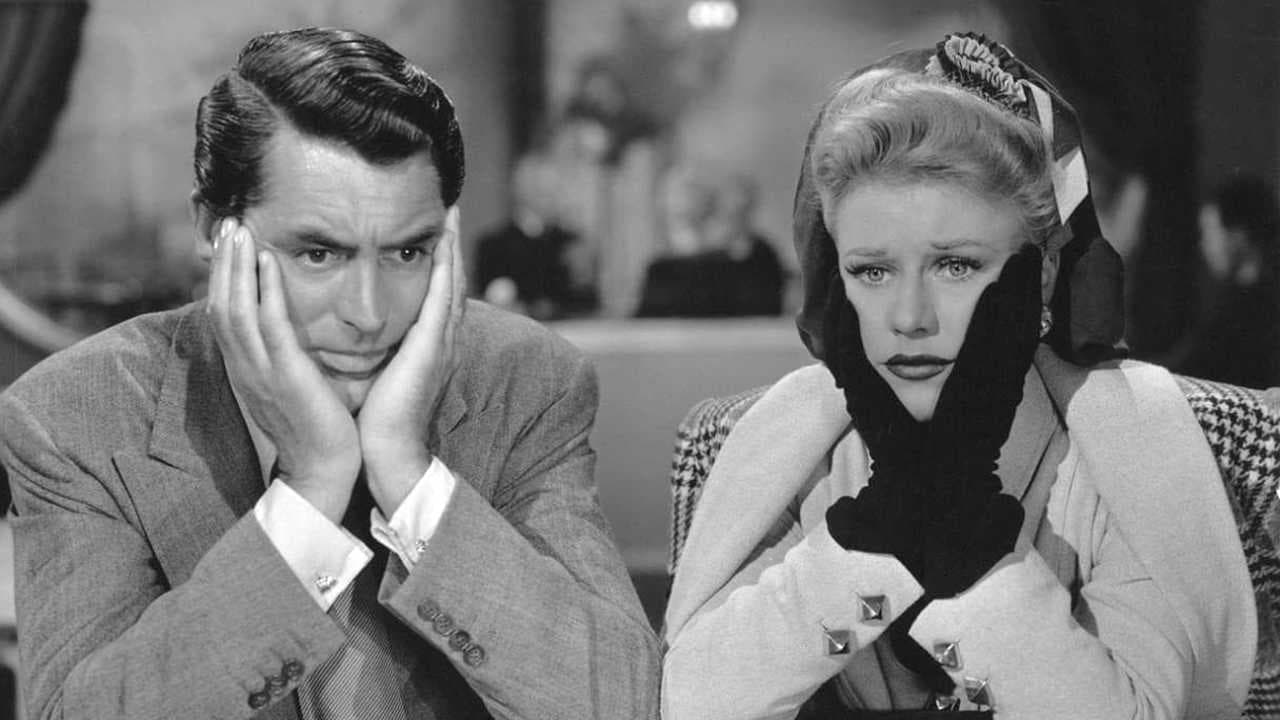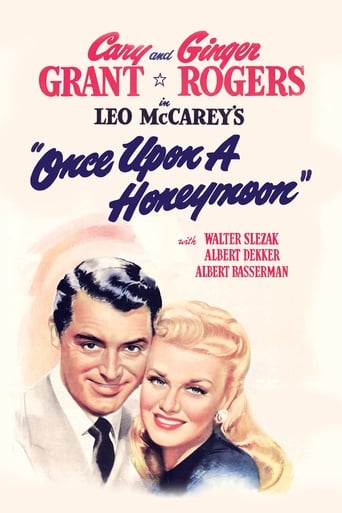



Really Surprised!
An Exercise In Nonsense
I think this is a new genre that they're all sort of working their way through it and haven't got all the kinks worked out yet but it's a genre that works for me.
View MoreIt's a movie as timely as it is provocative and amazingly, for much of its running time, it is weirdly funny.
View MoreOnce Upon a Honeymoon (1942)Well, a Cary Grant movie I haven't seen! The movie is limited, for sure, but Cary Grant is at his funniest. Watch it for him.Oh, yes, Ginger Rogers is the female lead, and she's her likable self (minus the dancing). The overall plot is skewed (for good reason) by World War II. A trifle. But we have Nazi nonsense upsetting a hearty American romance in Europe. Including a clock where the hands are a swastika.This is the same period and historical truth as "Casablanca," which of course takes it all much further—better writing, better photography, more romantic. The backdrop of the war here is often quite tragic, but there is no tragedy for the leads, who are affected but keep going. There is even what looks like some real Hitler footage (not sure how they got it contemporaneously). The humor throughout is pointed but certainly floating above the real awfulness.The overall plot (the large arc) is an entertaining take with serious overtones on the war and the enemies we were facing, as well as the fate of Jews (already clear by 1942). The movie ends up being largely a series of little scenes and funny gags—many of which are so funny they make it worth it. But overall the movie deserves some slapping down for not trying very hard. And it deserves watching because it's so good and warm and funny in so many parts. Besides, it's a Cary Grant romance out of nowhere. Good!
View MoreMany, did not like this film but I found it to be charming. The rapport between Cary Grant and Ginger Rogers is outstanding. In this year 2017, I find this film relevant. I never thought this before. Although, I don't know If I had seen the whole film before. It isn't shown very often. But I enjoyed it. I hope we are not taking the current circumstances for granted. Our freedoms are important! A gentle reminder within a charming love story.
View MoreThere are good war comedies, and this is not one of them. This is a very ambitious film, touching a lot of subjects:war, crime, love, comedy, humanity etc, however not proficient at any of them. And since some of these are very sensitive subjects, if you want people to laugh at them, you gotta make the "punchlines" extra strong. And this film just failed to do that. Some scenes stand out in terms of "comedy", Cary Grant was specially cute in a few of them. Although I like how natural the lines are(sometimes I even wonder if they were just improvising?), the pace of the movie is way too slow and too long. Neither the theme or scenes are cohesive, most of them are pretty awkward actually, is it a matter of laugh or grief? You just don't know what to feel about them. If you are a big fan of Cary Grant then I guess you would enjoy this movie, not very exciting for a Rogers' fan tho.
View More'Once upon a time' is the traditional beginning of a fairy tale so it may be unsurprising that ONCE UPON A HONEYMOON is something less than fanatic in the cause of surface realism. We're often merely informed of crucial plot twists that would seem to be the heart of the story. HONEYMOON begins halfway through its gold digger plot with Ginger Rogers' burlesque dancer having already snared her European Baron (Walter Slezak) by way of a phony 'Philadelphia socialite' scam complete with comically exaggerated accent. It's made clear that we are to take Grant and Rogers as falling in love literally at their first glances towards one another, generally a point in Romantic Comedy reached only after some sort of climax (like a Fred and Ginger dance, say). She accepts Grant's proof, whatever it was, that her husband is actually a Nazi agent off-screen while we are watching the Baron sell fake machine guns to a Polish general. Albert Dekker's photographer/agent, as well as Slezak's Baron, fortuitously turn up at the same Paris cafe as Grant, both suddenly in uniform, to set up our film's climax (not to mention our Jewish maid from Warsaw turning up at the right hotel in Paris in the nick of time). Magical things are happening just as in a fairy tale. And monsters are at hand as well.Our characters keep on breaking the fourth wall. When Rogers in all of her over-accented glory mockingly suggests that they should use separate rail cars, Slezak drolly replies: "That might be overdoing it," which implies the inside joke that she may be overacting. Grant quotes the famous song sung by Fred to Ginger: "I'll always remember you, the way you look tonight," though it's the middle of the day. Startled, Ginger looks back, apparently at McCarey, and seems to get the instruction to go on with the scene which leads both she and Cary to suppress their laughter when the maid seems to ad-lib the answer to Grant's: "Isn't she beautiful?" "Yes, and so are you." Finally we get Cary saying about a Nazi soldier stumbling over some rocks: "Stop doing that, that's not funny." Why isn't McCarey saying: 'Cut, let's try it again'?I can't say that I know, but it appears that he was anxious to make a statement rather than just to tell a story. He made the radical decision to insert world affairs, at this time meaning Nazi atrocities, within the framework of a Romantic Comedy. It still seems odd if not daring, but we've come to accept black subjects within out-and-out farces (TO BE OR NOT TO BE, THE GREAT DICTATOR, THE PRODUCERS, HOGAN'S HEROES). Why not romance? It could be said that Shakespeare did something of the same in his late comedies. Those were long controversial, and maybe still are, so why be surprised that HONEYMOON disturbs many viewers?I think a few common objections are flat-out wrong. Ginger Rogers' accent doesn't just come and go haphazardly, this is carefully thought out. A burlesque dancer with a taste for serious reading (Browning, Schopenhauer, Shakespeare), she partially drops the accent in a moment of tension when realizing the threat to the Jewish children (reality breaking into her life of pretense). It's dropped entirely when Grant realizes exactly who she is (Katie O'Hara from Brooklyn) and there's no use for it anymore, nor any need to explain this to Cary. Likewise, the thought that the movie is insensitive towards Jews is ridiculous. It's the very first film to directly confront the special horrors facing them at the time, and the full horror was not realized by anyone in 1942 (and, indeed, while terrible things had already happened, the FULL horror had yet to occur). You got a much clearer understanding of the plight of the Jews from ONCE UPON A HONEYMOON than you ever got from the State Department or the New York Times in 1942, or for several years thereafter.OTOH, I for one don't get the ending. Roger's statement, "Maybe that's what makes us better than them," seems pretty standard for the time, but her flippant, "He can't swim," seems to undercut it completely. But the rest of the movie couldn't be more obvious that we aren't like them, so what does the ending mean? I have no idea except that it's very black.As for performances, Grant is Grant, which means excellent and unique. Slezak is superb, the best I've ever seen him. Rogers is somewhat uneven, often superb (as in the great scene where she feigns ignorance of what vodka is, drinks Grant under the table, flashes some quotations at him only to realize how much in need of Polonius's advice she herself really is), yet not at all effective during the killing of Decker. This was something of a sign of things to come for Ginger. The movie periodically drags. It's opening scenes should have been tightened, and the Pledge of Allegiance scene should have been cut by at least 80%. Losing the pace became an increasing problem for McCarey. So I'll join everyone else in admitting that it's flawed, but in my opinion ONCE UPON A HONEYMOON is a flawed masterpiece and deserves to be rediscovered.
View More